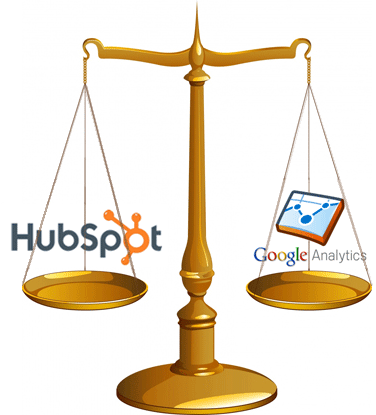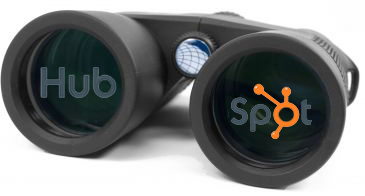Not a day goes by without someone asking us a question: “what analytics tool should I be using?” The most recent example took place on Monday, when a director of marketing for a manufacturing company has asked: “Do you need Google Analytics if you have Hubspot Analytics?”
Start with what you are measuring.
 The determining factor in selecting what tool to use is identifying what data you need. For each marketing objective, there is different data that you need to rely on. In this post, we are not going to select one tool over another one but will explain how and when each tool should be leveraged, and how these two tools should be meshed together.
The determining factor in selecting what tool to use is identifying what data you need. For each marketing objective, there is different data that you need to rely on. In this post, we are not going to select one tool over another one but will explain how and when each tool should be leveraged, and how these two tools should be meshed together.
Below is a table of top ten most common analytical objectives. Next to each objective is an overview of how each tool can help you get the necessary data to make informed marketing decisions and reach your objectives.

If you just care about basic reporting, then basically it does not matter. That being said, I would caution anyone who is not paying attention to their data about the accuracy of their marketing decisions.


| With Google Analytics, there is no quick and easy way to see if any of your leads are on your site. You can look at the returned visitors segment, but that’s about it. You can do a custom integration with Salesforce, but nothing that comes out of the box. | Integration with Salesforce (and other CRMs) allows you to track specific visitors/leads on your site. You can use this data to provide your leads with specific content based on where they are in the sales cycle. This is a sure way to increase your sales conversions and get new customers. |

| GA has everything you need to see direct traffic, referral traffic, campaign traffic, search traffic and AdWords traffic. You can slice the data any way you want. Recently, GA began rolling out attribution modeling. This feature will allow you to see how different marketing channels contribute to the conversion. | As a lead nurturing tool, Hubspot will offer excellent reporting on email marketing. However, it will not give you the same amount of data about traffic that is coming to the website. HubSpot has Conversion Assists reporting that will help you identify what type of content or web elements are helping the most with conversions. |

| GA can’t be used for competitive review. It is all about your data. | HubSpot offers competitors report for SEO and marketing improvements. |


Here, both tools go hand and hand exceptionally well. Google Analytics has a special section on SEO analytics. GA will also allow you to integrate webmaster toolkit that has a lot of features that helps with mastering SEO. HubSpot is built for inbound marketing. The keywords research tool will help you brainstorm new ideas for what type of content you can create, the competitors tool and analytics provided also give insights about what you’re web visitors want to see.

| Google Analytics advanced segmentation allows for comparison of certain visitor data sets against each other over time. These are custom built by each user to see correlations or contradictions between visitor behaviors. GA can also give you excellent reports on how your website is performing across mobile devices. | HubSpot will show you traffic patterns by different geographical regions. However, HubSpot will not be as granular as GA. |

| GA is a robust analytical platform, and under one account, you can track multiple properties. | For each website that you have, you need to purchase a separate HubSpot license. This is not ideal and can certainly be expensive. |


| Google Analytics should be a clear choice for this option. Although tracking these elements will require some custom tracking, GA can track every single step along your visitor’s journey. | Use HubSpot to track the content on your website that is built or deployed only by Hubspot, but is limited when trying to track other microconversions on your site such as video plays. |

| GA has a comprehensive section on content. You can run great reports to understand how the content is being consumed. You can also create goals to track engagement on your site, such as average visitor duration, pages/visit, and dynamic events within content. | HubSpot is all about Inbound Marketing. It will offer you all the reporting you need to help you create and market the best content. Hubspot wrote the book on Inbound Marketing, so of course the interface shows you the success of your inbound marketing. |

| Reports and Dashboards inside Google Analytics will give every person inside your company something to smile about. The amount of reports and dashboards you can create is virtually unlimited. All you have to know is what do your colleagues want. | We love the clean and simplified report interface because it shows the high level needs your management is interested in. Hubspot can also accurately track marketing campaign success with detailed email reporting and statistics, blog analysis, keyword research tools and more. |
Conclusion
We hope that the table we provided you with is helpful. Obviously, there is much more that can be said about Google Analytics and HubSpot, this is just a start. Remember the obvious – HubSpot is an inbound marketing tool; Google Analytics is a website analytics tool. Google Analytics should be your go-to solution for website analytics. HubSpot will complement Google Analytics and will make it easier for you to optimize your site, drive qualified traffic and succeed with inbound marketing. Hubspot Analytics and Google Analytics Comparison
To summarize, I think Hubspot says it best right on their website: “At the end of the day, Google Analytics and HubSpot are two distinct systems that each provide a unique perspective on the performance of your website and your larger marketing program. They are both designed to co-exist peacefully together on your website – in fact, most HubSpot customers use HubSpot and Google Analytics in conjunction with one another.” We love them both, and you should too.

Let us know if this post is helpful. If so, we can put together a guide for using Google Analytics and HubSpot together that’s a bit more extensive and related specifically to your business objectives.


